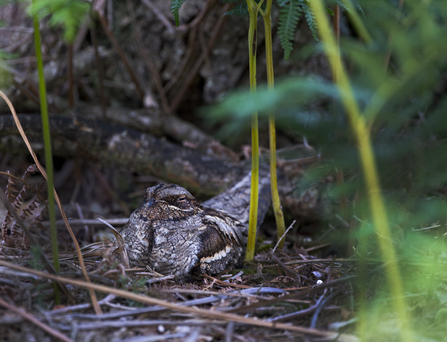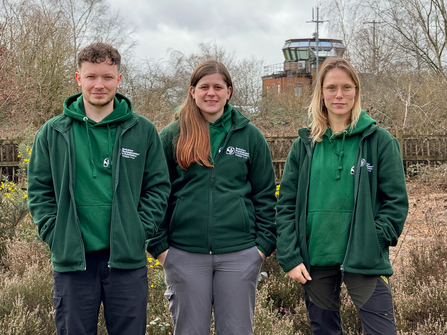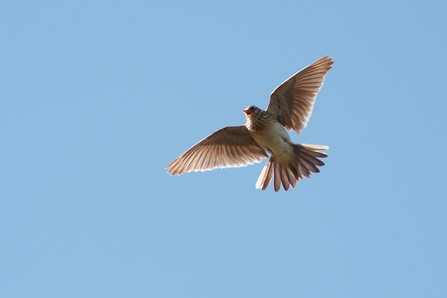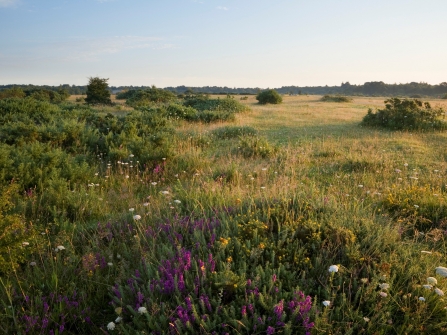Berkshire, Buckinghamshire & Oxfordshire Wildlife Trust (BBOWT) is making the appeal at two of its most popular nature reserves - Greenham & Crookham Commons and Snelsmore Common Country Park. Three new seasonal reserve wardens will help spread the word, talking to thousands of visitors about ground-nesting birds and how to help protect them.
Berkshire dog walkers asked to help protect rare heathland birds
Ground-nesting birds: skylark (Roy McDonald), nightjar (David Tipling) and Dartford warbler (Ben Hall).

Nightjar on nest by David Tipling
Friday, 1 March marks the start of ground-nesting bird season in the UK, when species such as nightjars, skylarks and Dartford warblers make nests on the ground or in low-growing bushes. Heathland sites such as Greenham & Crookham and Snelsmore near Newbury - managed by BBOWT on behalf of West Berkshire Council - offer the perfect environment for them.
Research shows that ground-nesting birds are in trouble, with around 66 per cent in decline in the UK. Sadly, loose dogs are one of the biggest causes of disturbance. So, the Trust is asking dog walkers to help it build on decades of work protecting these vulnerable species by making sure they stick to paths, alongside their dogs.
Walkers at Snelsmore Common with a dog off the lead. Image by Wendy Tobitt.
Roger Stace, BBOWT’s Berkshire Land Manager, said:
"There's so much incredible wildlife at these special sites, but it can easily be disturbed by people walking near where birds are nesting and by dogs sniffing around. People and dogs don't mean any harm, but they can cause birds to abandon their nests, leaving their chicks to die. One person or one dog may not make a difference, but if it happens again and again it definitely will.
“We know that our careful work managing these rare heathlands and talking to the public about wildlife is really paying off. Our annual surveys have found record numbers of Dartford warblers and woodlarks, and stonechats are also doing really well. Sadly though, skylarks are really struggling, so there is still work to be done. That's why we are asking people to come on board with what we're doing.”
In 2009, a BBOWT survey recorded 32 male skylarks that had established nesting territories on Greenham; last year there were just two. This decline is partly down to disturbance by people and dogs.

Seasonal wardens (from left to right): Patrick Gaffney, Zoe Burfitt and Martha Pearce at Greenham Common. Image by Roger Stace.
The three new wardens will be out and about on the commons chatting to visitors about how to protect wildlife, until after ground-nesting bird season ends on July 31. Warden Zoe Burfitt, who returns to the role from last year, is joined by former BBOWT trainee Martha Pearce, and new recruit Patrick Gaffney.
At both reserves, the wardens will be enforcing the same rules to protect wildlife. Visitors – whether walking, on bikes, on horseback, or with dogs - are asked to stick to the main paths, except when in sign-posted roam zones at Greenham or on the green route at Snelsmore.
Dog walkers are also asked to keep their dogs with them on the path at all times, except in the signposted areas. People who cannot keep their dogs under control, will be asked to use a lead.

Skylark by Stefan Johansson
Cllr Janine Lewis, West Berkshire’s Executive Member for Public Health, Culture, Leisure, Sport and Countryside said:
“We’re already seeing a steep decline in the number of male skylarks at Greenham, and if we don’t protect our ground nesting birds, it could be catastrophic for many other species too. Please heed the warning and walk your dog responsibly so that we can be a positive part of preserving this delicate and important life cycle.”
Responsible owners who keep their dogs under control will also help protect their pets from injury, road accidents, adder bites and from getting lost while out walking.
They will also be helping protect nature by:
- Lessening the negative impacts of dog poo and urine on precious habitats. The nutrients in dog waste enrich the heathland where the specialist plants are reliant on minimal inputs.
- Preventing dogs jumping in ponds, which can disturb aquatic wildlife.
- Insecticides found in flea treatments can pollute waterways.
- Reducing risks to other wildlife, farm livestock and grazing animals.
Mr Stace added:
"These are great places for a dog walk, as long as it’s done responsibly. We know this requires a bit more effort from our visitors, but we want our nature reserves to be wonderful places for wildlife, as well as people. We hope everyone who makes the effort to travel to these sites agrees that they are magical places that are worth protecting."

Greenham Common by James Osmond
